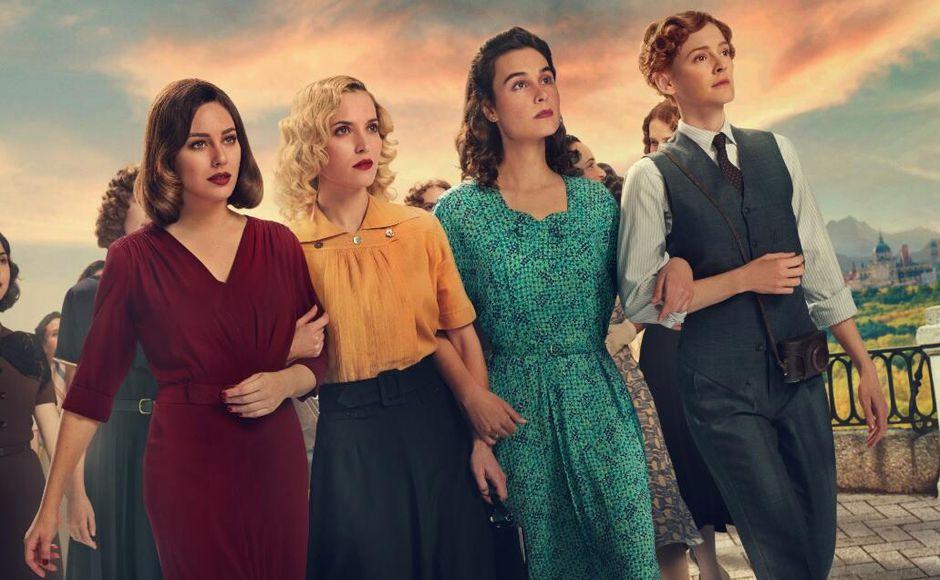(Promotional image for the Netflix series “Las Chicas del Cable”)
A student Quest presentation on Netflix’s first production in Spain ties in with a larger project on this influential medium that involves a faculty-student collaboration on a forthcoming book.
Allyson Voerg, a double major in English and broadcasting with a Spanish minor, will present “Netflix Spain Through a Critical Lens” as part of a 10 a.m. “Global Perspectives I” session during Quest on April 14. It’s the result of an independent study with Xose Pereira Boan, a modern languages and literatures faculty member co-editing an upcoming book on Netflix’s rollout, production and influences in Spain.
“During past semesters, I became aware of the importance of Netflix in students' routines and pastimes,” Pereira Boan said, wherein “each epoch has its own storytellers, its own narrative devices.” These range, he said, from Greek theatre to medieval troubadours to novels in the 19th century to 20th-century cinema. The beginning of the 21st century has become “the streaming age,” he said, where series from streaming services are evolving into the prevalent medium.
“Moreover, Spain, once a place of mere consumption, has now become a center of production and representation (of cultural identities, perspectives and practises),” Pereira Boan said. “Thus, I envisioned merging research and curriculum development with a focus on students' interests.”
One of those interested students, Voerg looks at the breakout hit “Las Chicas del Cable,” the first new series produced by Netflix in Spain. This research is an avenue “to see the ways narratives are expressed internationally, how the company of Netflix functions to tell these narratives through its streaming service, and how Spanish/Peninsular culture is portrayed in collaboration with an American platform,” Voerg said.
“I have been able to learn all of this and much more, including the ways Netflix Spain shows are successful and where they fall short, the history of Netflix Spain and how it came to be, and valuable insight into how each aspect of their filming or promotion, such as the settings where the shows were filmed, serves the whole,” Voerg said. “It is certainly interesting, beyond a student standpoint, to be able to see into the process of these shows’ creation, as we often know little about it and fail to be able to analyze the shows critically when we are watching them from a consumer’s perspective.”
“La Chicas del Cable” (also known as “The Cable Girls” in English-speaking markets) unfolds in Spain in the 1920s, when the country gets its first national telephone company. The show follows four young women who work there, with a context of the progress and equality it represents. However, in Voerg’s eyes, it does not always succeed in that context.
“While the show presents itself as a period piece paralleling modern feminism, in my paper I point out how several aspects of the show undermine not only its authenticity of depicting a historical time period, but that weaken its feminist message as well,” Voerg said.
While things like modern music, wardrobes, character development and the show’s title attempt to connect the narrative to modern times, “they result in the negligence of historical accuracy,” Voerg explained, “as for instance the modern music chosen does not reflect the music of the time period, or the clothing of the main characters is not true to what working-class women would wear at the time.”
Forthcoming publication
The presentation, and Voerg’s independent study, connect with Pereira Boan co-editing a book titled “Tu Casa, Mi Casa: Transnational Netflix’ Spain” with Jorge González del Pozo from U-Michigan-Dearborn. The book is under contract with the University of Wales Press, with expected distribution through its publishing partner the University of Chicago Press in the next academic year.
“We have assembled a diverse group of leading scholars from the U.S., Europe and Oceania with expertise in cultural and film studies for the volume,” Pereira Boan said. “It analyzes the tensions, contradictions, contributions and new horizons generated and/or imposed by the online platform within audiovisual culture in Spain.”
This is an important development because Netflix is creating its first European production hub in Madrid, “which has resulted in a new production landscape within the audiovisual industry of Spain,” Pereira Boan noted. “Contributors discuss the glocal [local and global] implications that Netflix' Spain has had in terms of exporting cultural identities from the plurinational State of Spain — comprising Basque, Catalan and Galician productions.”
The forthcoming publication also will explore “domestic and foreign representations of gender and race, as well as the narco-culture [crime-related subculture] Netflix has propelled through its catalogue,” Pereira Boan said. “Through this volume, we hope to launch a scholarly conversation of a phenomenon-in-progress, which has been heightened during these pandemic times of confinement, and, ultimately, to engage students in exploring the cultural products they consume through a critical lens.”
The Quest presentation also will include a brief overview of Voerg’s independent study of working with Pereira Boan to review and edit chapters for the upcoming publication.
“I plan to conclude with a reflection on how the opportunity to complete this independent study has allowed me to not only grow as a writer, editor, researcher and analyzer, but has better prepared me for what lies after my graduation next spring,” Voerg said. “Thus, those attending my presentation can expect a discussion of my independent study experience and get a glimpse into my own work regarding Netflix’ Spain.”
For more information on Quest, SUNY Oswego’s annual daylong celebration of scholarly and creative activities of the campus community, visit the Quest website.




